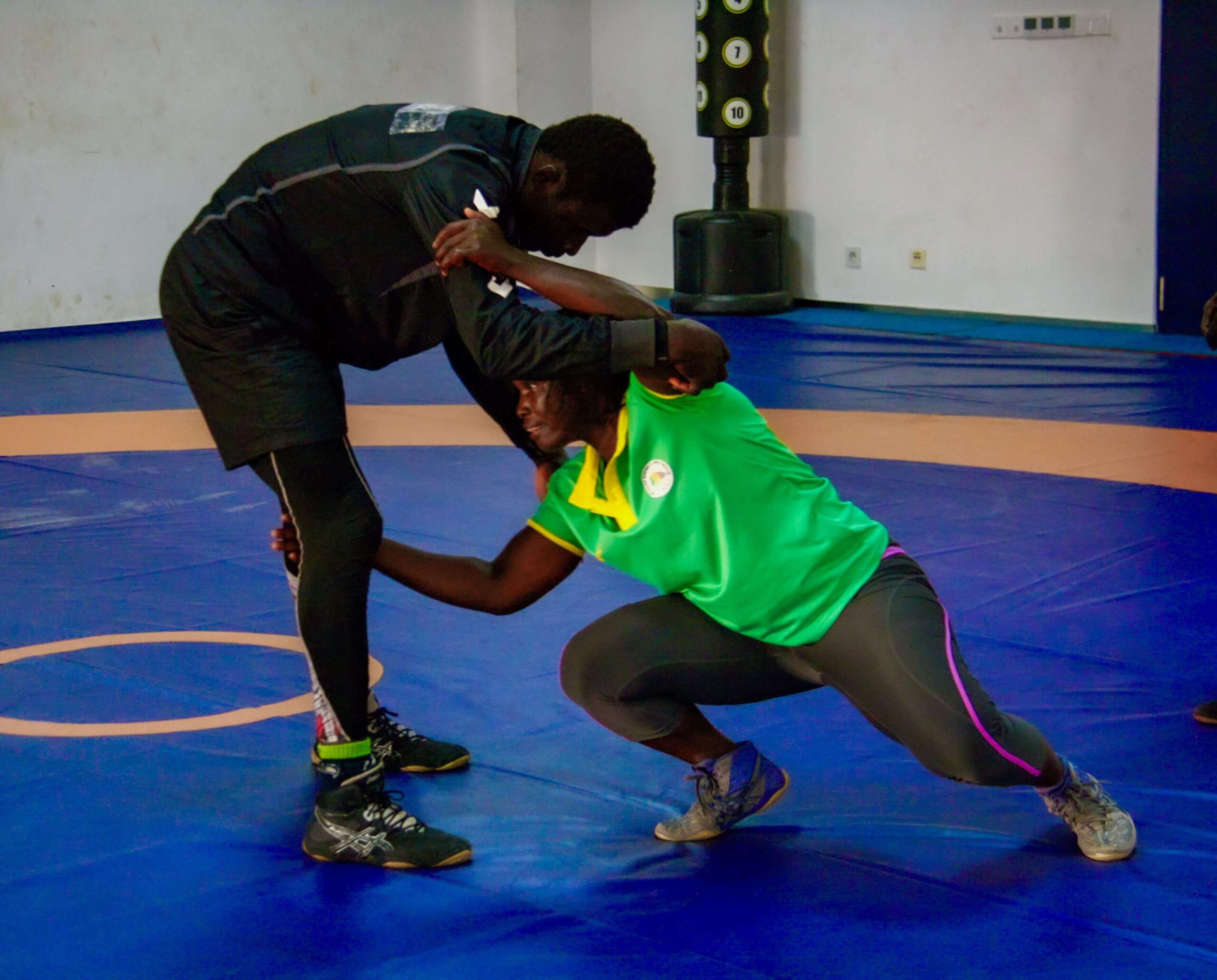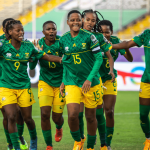Four men are warming up in one of the training rooms at the lower level of the Senegal National Arena in Dakar. They are waiting for their coach to train them in freestyle wrestling techniques.
Moments later, 42-year-old Isabelle Sambou walks in.
Standing just 152 centimetres (five feet) tall, Isabelle Sambou is a nine-time African Wrestling Championship gold medalist. And in 2015, she was crowned African Wrestler of the Decade by the World Wrestling Association.
“She is the best and so humble. We come from far away to learn from her,” said Demba Seck, one of the young wrestlers.
Sambou, who comes from the Casamance region in southern Senegal, is a national sensation. She is widely known for her many gold medals and daring to break barriers by competing in the national sport of Senegal.
Top traditional wrestlers are the equivalent of rock stars in Senegal, with massive followings. Known locally as Laamb or Lutte Traditionnelle, traditional wrestling is played out in large, sandy arenas, and professionals can win purses of up to US$300,000 at major tournaments.
A family thing
Wrestling is generally regarded as a sport for men and is associated with proving manliness.
For Sambou, wrestling runs in the family. Her mother and grandmother were strong wrestlers taking it up even against men. One of her cousins, Eveline Diatta, was among the first women wrestlers to compete for Senegal internationally.
“I wrestled just for the entertainment of our village and neighbourhood. You know, sometimes, when we wrestled, the boys and men would come and watch. One day, one said to me, ‘You wrestle well. Why don’t you do Olympic wrestling?’ I said, ‘No’, But he went to my older brother. My big brother said, ‘No problem. Right now, she is only wrestling for entertainment. If she can go wrestle to win something, that’s great.’ That’s how they got me into wrestling,” said Sambou.
At 19 years old, Sambou started training for Olympic wrestling in Ziguinchor in Casamance and, two years later, in 2001, began to compete in the African Wrestling Championships.
“When I went the first time, I got to the finals and lost it. It was a lack of experience because it was my first time. But in the second year, I took first place. In the third year, I won the final as well. In total, I won nine times,” said Sambou.
Sambou went to the global stage from here, participating in two Olympic wrestling competitions; London in 2012 and Rio in 2016.
In London, she advanced to the bronze medal match, where she was defeated by Carol Huynh of Canada, who had taken the Olympic medal in Beijing.
“We wrestled, but none of us made a point. You know, there was a “clinch” rule at that time. If the three minutes are up and nobody has scored any points, they will do a draw. The draw came up with this. I ended up in the fifth place,” she said.
At the 2016 Rio Summer Olympics, she competed in the freestyle 53 kg event. She defeated Nguyen Thi Lua of Vietnam in the first round and was defeated by eventual silver medalist Saori Yoshida of Japan during the quarterfinals, ending in 8th place.
Raising young wrestlers
Soon after, Sambou exited the international competition scene and returned to Senegal. “The career of a sportsperson is not long,” she said. But she had another plan.
“When I stopped, I said to myself, ‘I can’t go anywhere else. I must go back home to teach young people what I know, and I can’t keep my expertise to myself.’ So, I returned here to train young people,” she said.
It’s not only men that Sambou trains; she is teaching a new generation of young girls in Senegal to take up wrestling. Her training group consists of girls aged 12 and above.
“In Casamance, many girls want to be like me or do even more than me because they saw me on television, Facebook, or Google,” she said. “And sometimes, if I am there, they come to my house in the morning to make me watch how they wrestle. I train many young women.”
Tough times
But there are challenges. While men’s wrestling in Senegal receives enormous funding and support, there is still a significant lack of funding for women’s wrestling.
“When you return home, you have nothing. Right now, I have no house, no vehicle, nothing. I came back, and, in the beginning, I was in Ziguinchor. Then the president [of the Senegalese Olympic Wrestling Federation] told me to go here. They gave me the wrestling room, and I started to train kids. I coach, but there’s no salary,” she said.
“What we lack is the means. I would like to build a gym for wrestling in the Casamance,” she said.
To get by, Sambou cleans people’s houses in Dakar.
“If someone needs their house cleaned, I clean it. At the end of the month, you pay me, and I earn my living. And sometimes our federation reimburses me for transportation. But I don’t have a salary every month like other people. I have to live with my older brother because I cannot afford the rent for an apartment for myself,” she added.
Despite the challenges, Sambou is determined to see more female wrestlers emerging in Senegal. She regularly calls for investment into sports academies nationwide where wrestling, judo and other sports can be practised.
“If I had money to build a gym for wrestling, you would see what I’m talking about. I know there will be many female Olympic champions, and I am sure because the children are determined and like what they do. They love wrestling because it is part of their culture,” she said.
In addition, she also believes that local competitions and tournaments between regions would grow this sport.
“If there are regional and national championships, it will make wrestling better known. Then there will be wrestlers everywhere because children will watch it and say, ‘I’m going to be a wrestler too.’ That’s what is currently missing, but we don’t have a lot of resources,” said Sambou.
bird story agency
In the Senegal National Arena in Dakar, Isabelle Sambou trains young wrestlers in freestyle techniques. Sambou, a nine-time African Wrestling Championship gold medalist and former African Wrestler of the Decade, stands out for her achievements and humility. Hailing from the Casamance region, she followed a family tradition of wrestling and broke barriers in a sport dominated by men. Encouraged by her brother, she transitioned from village entertainment wrestling to Olympic wrestling, competing in the African Wrestling Championships and the Olympics in 2012 and 2016, finishing fifth and eighth, respectively.
After retiring from international competition, Sambou returned to Senegal to train young wrestlers, including girls aged 12 and above, inspired by her example. Despite significant challenges, including lack of funding and recognition compared to men's wrestling, Sambou is passionate about developing female wrestlers. She cleans houses to make a living and calls for investment in sports academies and local competitions to nurture future champions. Her dedication underscores the cultural importance of wrestling in Senegal and her vision for its growth among women.






